Amedeo Modigliani Biography
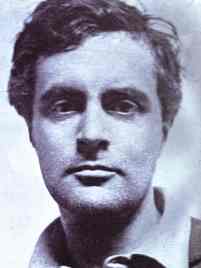
Amedeo Modigliani, one of the most popular artists of the 20th century, was born on July 12, 1884 into the family of Flaminio and Eugenia Modigliani, in Livorno (Leghorn), Tuscany. He was the forth and the youngest child in the family, which belonged to the secularized Jewish bourgeoisie. By the time Amedeo was born, the family business was in down, to go bankrupt some years later. Eugenia Modigliani, Amedeo’s mother, came from France. To contribute to the family income she gave private lessons and made translations. It was she who liked to create myths around the family and encouraged this trait in her younger son.
The attack of typhoid in 1898 was a turning point in Modigliani’s life. After recovering he was allowed to drop school and start to take lessons in drawing and painting at the Art Academy in Livorno. By 1900, his health condition aggravated, he contracted tuberculosis and spent the winter of 1900/01 in Naples, on Capri and in Rome. In 1902, Modigliani enrolled in the Scuola libera di Nudo (Free School of Nude Studies) in Florence. He visited Florence’s museums and churches and studied the art of the Renaissance, which he learned to admire. A year later Modigliani moved to Venice, where he enrolled in the Instituto di Belle Arti di Venezia and continued the self-study of old masters. It is in Venice that he first tried hashish. Two years later Modigliani went to Paris. He took life-drawing classes at the Académie Colarossi and befriended many colleagues from all over the world. Despite his poor health, he participated in the debauched life of the artists on Montmartre. The German painter Ludwig Meidner described him in the following way, “Our Modigliani, or ‘Modi’ as he was called – was a characteristic and, at the same time, highly talented representative of Bohemian Montmartre; he was probably even its last true Bohemian”.
In 1907, Modigliani got his first patron – the young medical doctor Paul Alexandre (Portrait of Paul Alexandre Against a Green Background), who bought paintings and drawings from Modigliani and got him commissions for portraits. Thus, the painting The Amazon (1909) - was a commission from the Baroness Marguerite de Hasse de Villers, which she made on Dr. Alexandre’s recommendations. But the sitter was so infuriated with the finished portrait that refused to take it and Dr. Alexandre bought it.
Through Dr. Alexandre (in 1909) Modigliani made the acquaintance of the Romanian sculptor Constantin Brancusi, under the influence of whom he switched to stone sculpture, which prevailed over his painting for some time. One of the legends says that Modigliani stole the big blocks of stone for his sculptures from the surrounding construction sites and the railway sleepers, intended for the Métro, for his wooden heads. Modigliani never bothered to refute any gossip and fantasies concerning him.
In spring of 1910, Modigliani got acquainted with a young Russian poetess Anna Akhmatova. Their passionate love affair lasted till the August of 1911, when they parted never to meet again.
Modigliani’s sculptures were exhibited in the autumn Salon of 1912, some of them were even bought; but by 1914 the artist was again more interested in painting. In June of 1914, he met the talented and eccentric English woman, Béatrice Hastings, who had been a circus artist, a journalist, a poetess, a traveler, an art critic, and maybe tried other professions, of which we don’t know. Later she would write of him, “A complex character. A swine and a pearl. Met him in 1914 at a crémerie. I sat opposite him. Hashish and brandy. Not at all impressed. Didn’t know who he was. He looked ugly, ferocious and greedy. Met him again at the Café Rotonde. He was shaved and charming. Raised his cap with a pretty gesture, blushed and asked me to come and see his work. And I went. He always had a book in his pocket. Lautrémont’s Maldoror. The first oil painting was of Kisling. He had no respect for anyone except Picasso and Max Jacob. Detested Cocteau. Never completed anything good under the influence of hashish.” Béatrice became Modigliani’s mistress and preferred model for the next two years. Though her portraits can’t be called flattering, more vice versa – she’s shown round-faced, small-featured, with pursed lips and small empty eyes. Beatris Hastings. Madam Pompadour (Portrait of Beatrice Hastings).
In August of 1914, the First World War broke out. Modigliani wanted to enlist but was exempted from military service for health reasons. Paul Alexandre was enlisted, ending the contract between him and the artist. The art dealer Paul Guillaume offered Modigliani his support. In 1916, Modigliani befriended the Polish poet and art dealer Léopold Zborovski (1889-1932) and his wife Anna (Hanka), who would become his supportive friends. Modigliani painted them several times.
In April of 1917, Modigliani met the 19-year-old Jeanne Hébuterne (1898-1920), student of the Académie Colarossi; they started to live together. “She was gentle, shy, quiet and delicate. A little bit depressive”, the writer Charles-Albert Cingria characterized Jeanne. She became his major model until his death, he painted her no less than 25 times.
On December 3, 1917 Modigliani’s first one-man exhibition was opened at the Berthe Weill Gallery. Unfortunately the gallery was situated opposite a police station, the chief of which was scandalized by Modigliani’s nudes and forced him to close the exhibition within a few hours after its opening.
In spring of 1918, Modigliani and Jeanne left Paris, which was under the threat of occupation by Germans, and went for the southern coast. In Nice and its environments Modigliani produced most of the paintings that would later become his most popular and highest-priced works. On November 29, 1918 in Nice, Jeanne Hébuterne gave birth to a girl, who was recognized by Modigliani as his daughter. She was given the same Christian name as her mother.
At the end of May of 1919, Modigliani returned to Paris. After several successful exhibitions in England, English collectors started to buy his paintings. But by the end of the year Modigliani became seriously ill with tuberculosis. On January 24 1920 he died. On the following day the pregnant Jeanne Hébuterne committed suicide. They were buried together in the Père Lachaise cemetery. Their orphan daughter Jeanne (1918-1984) was adopted by Modigliani’s sister in Florence; later she would write an important biography of her father Modigliani:Man and Myth.
Bibliography
Modigliani (Great Modern Masters) by Amedeo Modigliani, Alberto Curotto (Translator), Jose Maria Faerna. Abradale Press, 1997.
Prose of the Poet. By Anna Akhmatova. Introductory article by A. Neiman. Moscow. 2000.
Amedeo Modigliani 1884-1920: The Poetry of Seeing (Basic Art) by Doris Autkrystof (Editor), Doris Krystof. TASCHEN America Llc, 2000.
Amedeo Modigliani: Protraits and Nudes (Pegasus Library) by Anette Kruszynski. Prestel USA, 1996.
Amedeo Modigliani by Frances Alexander, Jack Michael. Parkstone Press, 2001.
The Unknown Modigliani: Drawings from the Collection of Paul Alexandre. by Noel Alexandre, Paul Alexandre. Harry N Abrams, 1993.
Amedeo Modigliani: Portraits and Nudes (Pegasus Library Paperback) by Anette Kruszynski, Amedeo Modigliani. Prestel USA, 2000.
Amedeo Modigliani by Marc Restilinni. Skira, 2002.
Modigliani by Fedrico Zeri. NDE Publishing, 2001.
- Portrait Of Paul Alexandre Against A Green Background.
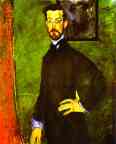
1909. Oil on canvas. 100 x 81 cm. Private collection. Read Note.
- Woman In Yellow Jacket (The Amazon).
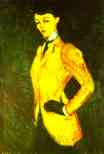
1909. Oil on canvas. 92 x 65 cm. Private collection.
- Portrait Of Beatrice Hastings.
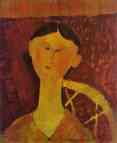
1915. Oil on canvas. 55 x 46 cm. Art Gallery of Ontario, Toronto, Canada. Read Note.
- Beatris Hastings.

1915. Oil on canvas. 81 x 54 cm. Private collection. Read Note.
- Madam Pompadour (Portrait Of Beatrice Hastings).

1915. Oil on canvas. 61 x 50.4 cm. Art Institute of Chicago, Chicago, IL, USA. Read Note.
- Portrait Of The Art Dealer Paul Guillaume.
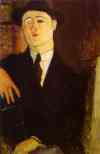
1916. Oil on canvas. 80.5 x 54 cm. Civico Museo d'Arte Contemporanea, Milan, Italy.
- Portrait Of The Polish Poet And Art Dealer Leopold Zborovski (1889-1932).

1918. Oil on canvas. 46 x 27 cm. Private collection. Read Note.